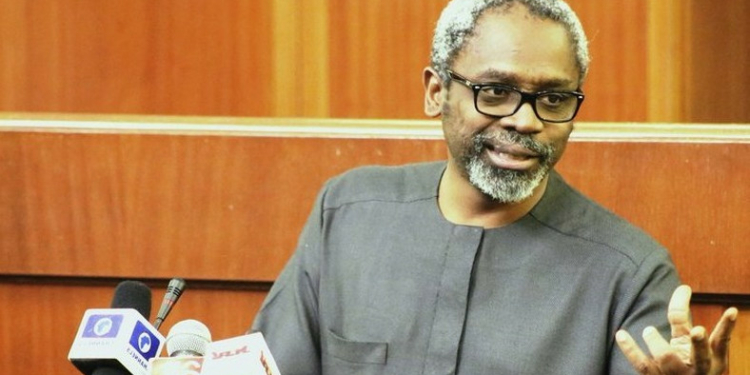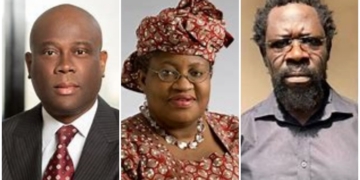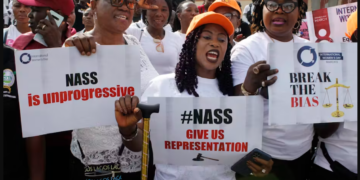Speaker of the House of Representatives, Hon. Femi Gbajabiamila has said that Nigeria cannot achieve political dependent based on the rights of the Nigerian people to choose their leaders in a free and fair election without interference and imposition and yet argue for the imposition of quotas in elective offices.
The Speaker also said that he owes his success in the political arena to his mother who he said encouraged his participation in politics, stressing that he want to be remembered as someone who contributed to active women participation in the political life of the country.
To this end, he said he would be proposing Women’s Victory Fund at the next meeting of the National Executive Committee of the his party, the All Progressives Congress and ask all other parties to do the same as a way of raising money to encourage women participation in the electoral process of the country.
Delivering a keynote address at a Women in Politics dialogue forum organised by Women in Management, Business and Public Service in Abuja, the Speaker said “I have heard it said that we can achieve increased gender participation in politics by imposing quotas and allocating elective political office.
“We cannot on the one hand advocate for a new kind of politics dependent on respect for the basic human right of all people to choose their leaders in free and fair elections without interference and imposition, and on the other hand argue for the imposition of quotas in elective office.
“This is a fundamentally antidemocratic idea, and the proposition collapses under the weight of its own contradictions.”
He told them that they cannot achieve anything in politics or hope to occupy political positions without first joining a political party and playing active part in its as they must first belong to a party before they can be nominated for elective office.
He said “my participation in politics is a legacy of my mother and I owe my achievements in this arena to her. Now, I am a father of daughters for whom I hold the highest ambitions.
“At the end of my career in politics, it is my hope that I would have contributed constructively to the achievement of a society where my daughters and all our daughters can live up to their highest aspirations, freed from discrimination on the basis of their gender, and protected from the worst consequences of our patriarchal society.”
The Speaker said further that historical evidence suggests that when women take part in the politics of their nations, they can make a difference, adding that women’s participation in elected office prioritises policies that focus on the key development indicators of quality of life, community, family, and protection of the most vulnerable in our society.
He said “It is also evident, that economic and social advancement for women will not be achieved to the extent we desire and at the pace we expect, until women have an equal seat at the political table where the grand decisions of nationhood are made.
“In Nigeria, we contend with a culture that has created, and too often continues to encourage and tolerate practices that disenfranchise our women, limit educational and economic opportunities available to them and restrict their ability to reach their highest potential.
“It is here, that any and all successful efforts at reform must begin, because our present circumstances are not a function of statutory obstacles for women who wish to participate in politics or the absence of laws that protect your interest in this regard.
“This is but one more time in the great march of history when the forces of progress and change, must confront and defeat the rear-guard of conservatism, armed with superior argument and better organisation, motivated by the certain knowledge that the arc of the moral universe might be long, but as always, it bends towards justice.
“There is perhaps an expectation that I will use the opportunity of this platform to set out a list of legislative proposals and make grand pronouncements about constitutional amendments.
“I did that in my early years in the National Assembly, most memorably by proposing legislation that would have ended the practice of corporate organisations using women as bait to lure clients and acquire deposits, and penalising those who refuse to participate.
“I learned from these experiences that to achieve our objectives, we must sometimes focus away from proposing legislation for which there is no political support and imposing unworkable mandates that make us feel good but achieve nothing.
“There are circumstances that call for legislative action to protect rights and impose obligations, but we must not conflate these with those situations when our objectives are better served through other means.”
He said the Nigerian constitution of Nigeria does not impose any restrictions on women’s participation in politics as it expressly prohibits any and all gender-based discrimination, adding that any conversations around gender quotas in political office cannot occur outside of a constitutional amendment.
He expressed concern that the peculiar history of the country is such that Nigerians are unlikely to achieve a more equitable society by amending the constitution to accommodate discriminatory practices no matter how well-meaning our motivations may be.
He said it was real that not enough women are participating actively in the political life of the country, pointing out that as a result of this, the nation is poorer for it, adding that “this situation will not change of its own accord”.
The Speaker informed the gathering of women that the 9th House of Representatives has presented its legislative agenda to the public with gender equity in economic participation, political representation, access to justice and opportunity featuring as critical parts of that agenda.
He said “We have agreed that over the next four years, the House of Representatives will support and encourage efforts to actively recruit, train and promote women who choose to participate in public service and electoral politics.
“We will enthusiastically engage with non-governmental organisations, civil society partners and political action committees to organise within the major political parties and at the grassroots to communicate the need to have greater gender diversity amongst political office holders.
“We will through the Gender Technical Unit in the National Assembly fund programmes that support women in politics so that as we elect more women, we enable them also to be successful in the discharge of the responsibilities of their office.”
He also told them that “elections are generally won on four things: candidate, ideas, funding and organisation. I believe that if we recruit more inspired candidates, fund them and provide them organisational support to effectively manage their political operations, we will get more women to participate in electoral politics.
“These women will have a better chance of winning their party primaries and the general elections. Keep in mind the one universal truth about political parties; they all want to win the elections, and they will often, nominate and support the candidate with the best chance of doing so.
He said the bulk of the work of getting more women to participate in politics and ensuring that more of them can win electoral office, will happen within the political parties in the country.
He encourage them who do not yet belong to any political party to go out, register and participate in the engagements and the activities of whatever political party they chose so that when decisions are made, their voice will be heard.
He also informed them of his intention to propose the creation of a special Women’s Victory Fund to support at the next National Executive Committee meeting of the All Progressives Congress (APC) to recruit more women who will contest elections on the platform of the party.
The Victory Fund he said will allow the party, independent of its other activities, to engage with organisations such to identify willing and capable women from all works of life to contest for elections at all levels of governance.






Discussion about this post